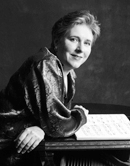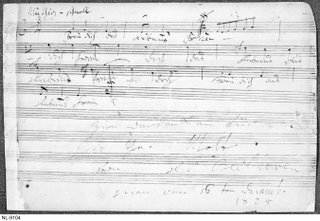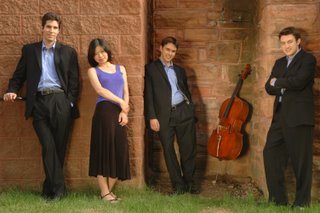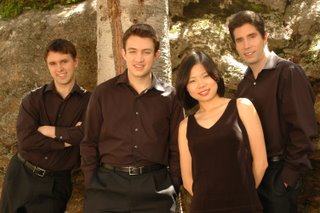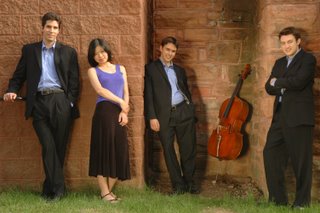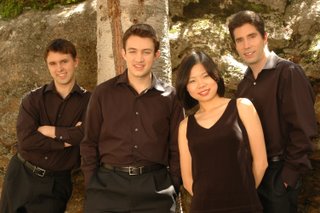MONTRÉAL le 21 avril 2008
Communiqué de presse
L'ORCHESTRE DE CHAMBRE McGILL
présente
Le Quatuor à cordes Escher
Dans leur début montréalais
« Bons baisers de Vienne »
Invité par l'OCM, le renommé Quatuor à cordes Escher se produira le lundi 5 mai 2008 à 19 h 30 à la salle Pollack.
Les membres du Quatuor sont : Adam Barnett-Hart (violon); Wu Jie (violon); Pierre Lapointe (alto); Andrew Janss (violoncelle)
Le jeune Quatuor à cordes Escher a rapidement acquis une réputation de calibre mondial. Leur sonorité individuelle, leurs décisions artistiques inspirées et la cohésion unique du jeune ensemble ont immédiatement conquis Pinchas Zukerman et Itzhak Perlman, qui tous deux invitèrent le Quatuor Escher a devenir quatuor en résidence à leur festival estival respectif. Le Quatuor à cordes Escher prend son nom du graphiste hollandais M. C. Escher, reconnu pour sa méthode de lier des composantes individuelles pour former un tout.
Le Quatuor fera ses débuts montréalais lors de ce concert, bien que deux de ses membres connaissent bien Montréal.
En 2004, l'altiste canadien Pierre Lapointe a reçu un prix de la lieutenante-gouverneure du Québec pour son travail au Conservatoire de musique de Gatineau. Avant cette distinction, l'Université d'Ottawa lui avait décerné une médaille d'or pour son diplôme de premier cycle en composition et interprétation.
La violoniste Wu Jie est arrivée à Montréal à l'âge de 16 ans et a étudié auprès de Yuli et Eleanora Turovsky pendant deux ans avant de déménager à New York. Elle a acquis ses lettres de noblesse sur la scène musicale internationale tant comme soliste que chambriste. Pinchas Zukerman, avec lequel elle a étudié, a écrit que : « son talent est un cadeau pour nous tous ».
En 1999, Wu Jie recevait le Premier Prix au Deuxième Concours international de violon d'Orford à la suite de son interprétation époustouflante du concerto pour violon de Barber, diffusée à la grandeur de la province de Québec. Grâce à cette victoire, elle a été invitée à jouer avec l'Orchestre du CNA, I Musici de Montréal, l'orchestre de l'école FACE, ainsi qu'en tournée avec l'orchestre symphonique du Conservatoire de musique de Shanghai, et en récital à Montréal, Ottawa, Shanghai et New York.
Voici le programme de la soirée :
Alexander von ZEMLINSKY Quatuor à cordes no 4, op. 25 (Suite)
Alexander von Zemlinsky a composé son Quatuor à cordes, opus 25 pendant l'été de 1936, bien qu'il a fallu attendre 1967 avant la première. Un hommage à son ami Alban Berg, décédé la veille de Noël 1935, Zemlinsky considérait cette pièce comme une Suite. À l'instar de la Suite lyrique de Berg, la Suite de Zemlinsky est en six parties, et construite en trois « actes » partageant un même matériau thématique et une structure qui opposent et font contraster les mouvements lents et rapides. L'uvre est en outre la parfaire illustration de l'étonnante maîtrise technique et de l'inventivité musicale d'un Zemlinsky en pleine maturité.
Wolfgang Amadeus MOZART Quatuor à cordes en sol majeur, K. 387
« À mon cher ami Haydn. Un père qui avait résolu d'envoyer ses enfants à la découverte du monde, les avait, selon son devoir, confiés à la protection et à l'encadrement d'un Homme très célèbre, qui par très bonne fortune, se trouvait par la même occasion être son meilleur Ami. » Ainsi se lit l'inscription de Mozart sur le jeu de six superbes quatuors à cordes composés entre 1782 et 1785, et qu'il avait dédicacés à son ami et collègue, Josef Haydn.
Franz SCHUBERT Quatuor à cordes en ré mineur, D 810
« La Jeune Fille et la Mort »
Schubert a commencé à composer son quatuor à cordes ne ré mineur en 1824, mais ne le compléterait à sa satisfaction qu'en février 1826. L'uvre sera publiée à titre posthume en 1832. Le quatuor en ré mineur doit son surnom « La Jeune Fille et la Mort » à son deuxième mouvement dont le thème et les variations sont basés sur le Lied de Schubert Der Tod und das Mädchen (D.531) qu'il avait composé en 1817 sur un court poème de Mathias Claudius.
-30-
Les billets sont aux prix de 38 $ |30 $ | 25 $ |10 $/Étudiants
Pour plus de renseignements : Susan McKinnon Bell, directrice administrative, 5459, avenue Earnscliffe, Montréal, Québec H3X 2P8
514-487-5190 | 514-487-7390 (fax) |514-830-6033 (cellulaire)
www.ocm-mco.org
sbell@ocm-mco.org
